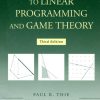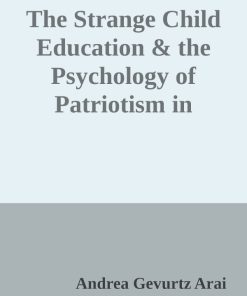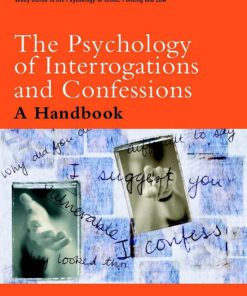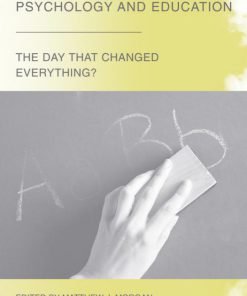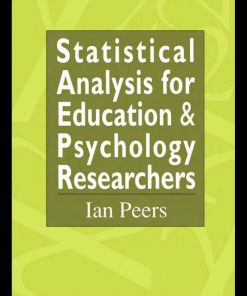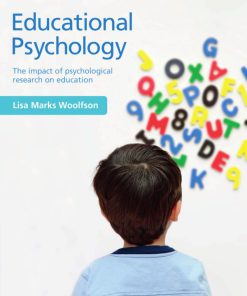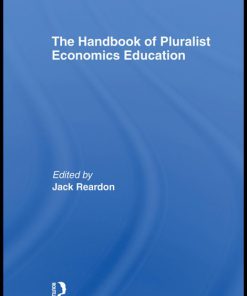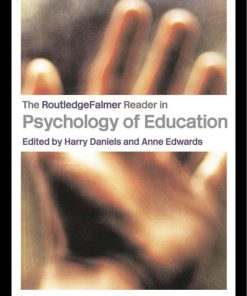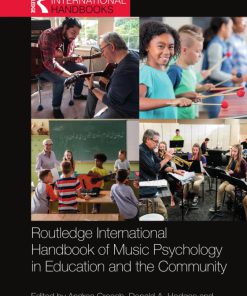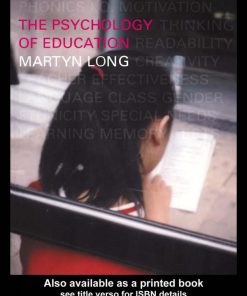The Praeger Handbook of Education and Psychology Four Volumes 1st edition by Joe Kincheloe,Raymond Horn 0313014809 9780313014802
$50.00 Original price was: $50.00.$25.00Current price is: $25.00.
Authors:Joe L. Kincheloe, Raymond A. Horn , Series:Psychology [55] , Tags:Psychology , Author sort:Joe L. Kincheloe, Raymond A. Horn , Languages:Languages:eng , Published:Published:Jul 2008 , Publisher:Praeger , Comments:Comments:Praeger Publishers, 88 Post Road West, Westport, CT 06881 An imprint of Greenwood Publishing Group, Inc.
The Praeger Handbook of Education and Psychology Four Volumes 1st edition by Joe Kincheloe,Raymond Horn – Ebook PDF Instant Download/Delivery.9780313014802,0313014809
Full download The Praeger Handbook of Education and Psychology Four Volumes 1st edition after payment
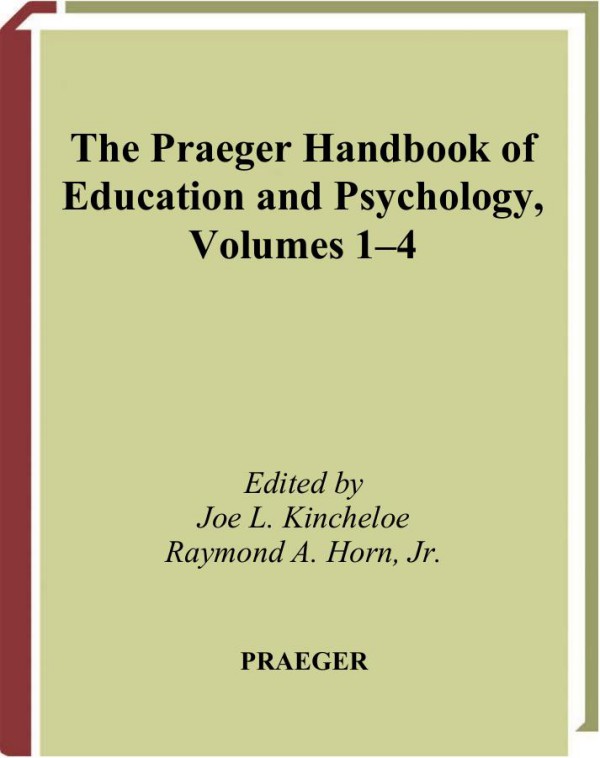
Product details:
ISBN 10:0313014809
ISBN 13:9780313014802
Author: Joe Kincheloe,Raymond Horn
The Praeger Handbook of Education and Psychology Four Volumes 1st Table of contents:
PART I INTRODUCTION
1. Introduction: Educational Psychology—Limitations and Possibilities
2. Educational Psychology Timeline
PART II INTRODUCING THEORISTS IMPORTANT TO EDUCATION AND PSYCHOLOGY
3. Albert Bandura
4. Jerome Bruner
5. Judith Butler
6. John Dewey
7. Erik Erikson
8. Howard Gardner
9. Carol Gilligan
10. Emma Goldman
11. Jurgen Habermas
12. Granville Stanley Hall
13. Sandra Harding
14. bell hooks
15.William James
16. Lawrence Kohlberg
17. Jacques Lacan
18. Gloria Ladson-Billings
19. Jean Lave
20. Alexander R. Luria
21. Herbert Marcuse
22. Abraham Harold Maslow
23. Maria Montessori
24. Nel Noddings
25. Ivan Petrovich Pavlov
26. Jean Piaget
27. Carl Rogers
28. B. F. Skinner
29. Robert J. Sternberg
30. Beverly Daniel Tatum
31. Lewis Madison Terman
32. Edward L. Thorndike
33. Rudolph von Laban
34. Lev Vygotsky
35. Valerie Walkerdine
36. John Watson
Volume 2
PART III ISSUES IN EDUCATION AND PSYCHOLOGY
Constructivism
37. Constructivism and Educational Psychology
38. Reconsidering Teacher Professional Development Through Constructivist Principles
39. Constructivist/Engaged Learning Approaches to Teaching and Learning
Creativity
40. Creative Problem Solving
41. Creativity
Criticality
42. Reclaiming Critical Thinking as Ideology Critique
43. Ideological Formation and Oppositional Possibilities of Self-Directed Learning
44. Literacy for Wellness, Oppression, and Liberation
45. Transformative Learning: Developing a Critical Worldview
Culture/Cultural Studies
46. The Impact of Apartheid on Educational Psychology in South Africa: Present Challenges and Future
47. Implications of Cultural Psychology for Guiding Educational Practice: Teaching and Learning as C
48. The Culture/Learning Connection: A Cultural Historical Approach to Understanding Learning and De
49. Endorsing an Angel: Peggy Claude-Pierre, the Media and Psychology
50. The Buddha View: ReVIEWing Educational Psychology’s Practices and Perspectives
51.Without Using the “S” Word: The Role of Spirituality in Culturally Responsive Teaching and Ed
Developmentalism
52. Beyond Readiness: New Questions about Cultural Understandings and Developmental Appropriateness
Educational Purpose
53. Foundations of Reconceptualized Teaching and Learning
54. The Diverse Purposes of Teaching and Learning
55. Postmodern Pedagogy
Volume 3
Enactivism
56. Complexity Science, Ecology, and Enactivism
57. Providing a Warrant for Constructivist Practice: The Contribution of Francisco Varela
Knowledge Work
58. Action Research and Educational Psychology
59. Beyond the “Qualitative/Quantitative” Dichotomy: Pragmatics, Genre Studies and Other Linguis
60. Knowledge in a Reconceptualized Educational Environment
61. Critical Epistemology: An Alternative Lens on Education and Intelligence
62. Dialogism: The Diagotic Turn in the Social Sciences
Learning
63. Experiential Learning
64.Workplace Learning, Work-Based Education, and the Challenges to Educational Psychology
65. Dialogic Learning: A Communicative Approach to Teaching and Learning
66. John Dewey’s Theory of Learning: A Holistic Perspective
67. Crash or Crash Through: Part 1—Learning from Enacted Curricula
68. Crash or Crash Through: Part 2—Structures That Inhibit Learning
Memory
69. Memory: Counter-memory and Re-memory-ing for Social Action
70. Memory and Educational Psychology
Mind
71. Where Is the Mind Supposed to Be?
72. Neuropolitics: Neuroscience and the Struggles over the Brain
73. Desperately Seeking Psyche I: The Lost Soul of Psychology and Mental Disorder of Education
74. Desperately Seeking Psyche II: Re-Minding Ourselves, Our Societies, Our Psychologies, to Educate
Psychoanalysis
75. What Educational Psychology Can Learn from Psychoanalysis
Race, Class, and Gender
76. Using Critical Thinking to Understand a Black Woman’s Identity: Expanding Consciousness in an Ur
77. Pedagogies and Politics: Shifting Agendas within the Gendering of Childhood
78. Knowledge or Multiple Knowings: Challenges and Possibilities of Indigenous Knowledges
79. Making the “Familiar” Strange: Exploring Social Meaning in Context
80. Gender and Education
81. TEAM: Parent/Student Support at the High School Level
82. Becoming Whole Again through Critical Thought: A Recipe
Volume 4
Situated Cognition
83. Situated Cognition and Beyond: Martin Heidegger on Transformations in Being and Identity
84. Situating Situated Cognition
85. Stakeholder-Driven Educational Systems Design: At the Intersection of Educational Psychology and
Teaching
86. Teacher Thinking for Democratic Learning
87. Recognizing Students among Educational Authorities
88. Critical Consciousness and Pedagogy: Reconceptualizing Student-Centered Dialogue as Educational
89. Homeschooling: Challenging Traditional Views of Public Education
90. Activity Theory as a Framework for Designing Educational Systems
91. Reconnecting the Disconnect in Teacher—Student Communication in Education
Testing/Assessment
92. The Rise of Scientific Literacy Testing: Implications for Citizenship and Critical Literacy Skil
93. What Are We Measuring? A Reexamination of Psychometric Practice and the Problem of Assessment in
94. Curriculum, Instruction, and Assessment in a Reconceptualized Educational Environment
PART IV: NEW VISIONS—POSTFORMALISM: EDUCATION AND PSYCHOLOGY
Curriculum
95. Race in America: An Analysis of Postformal Curriculum Design
Epistemology
96. Upside Down and Backwards: The State of the Soul in Educational Psychology
97. Critical Constructivism and Postformalism: New Ways of Thinking and Being
Intelligence
98. Intelligence Is Not a Thing: Characterizing the Key Features of Postformal Educational Psycholog
99. Unpackaging the Skinner Box: Revisiting B.F. Skinner through a Postformal Lens
Multilogicality
100. Postformalism and Critical Multiculturalism: Educational Psychology and the Power of Multilogic
Ontology
101. Postformalism and Critical Ontology—Part 1: Difference, Indigenous Knowledge, and Cognition
102. Postformalism and Critical Ontology—Part 2: The Relational Self and Enacted Cognition
Paradigmatic Change
103. Educational Psychology in a New Paradigm: Learning a Democratic Way of Teaching
104. Alternative Realities in Educational Psychology: Postformalism as a Compelling Force in Opposit
105. Educational Psychology on the Move: Visual Representations of the Old and New Paradigms
Pedagogy
106. Toward a Postformal Model of History Education
Power
107. Postformalism and a Literacy of Power: Elitism and Ideology of the Gifted
Research
108. Research in Educational Psychology: Incorporating the Bricolage in Educational Psychology—Par
109. Research in Educational Psychology: The Bricolage and Educational Psychological Research Method
Spirituality
110. The Spiritual Nature of Postformal Thought: Reading as Praxis
People also search for The Praeger Handbook of Education and Psychology Four Volumes 1st :
the praeger handbook of community mental health practice
the praeger international handbook of special education
the praeger handbook of education and psychology volumes 1 4
the praeger handbook of education and psychology pdf
the palgrave handbook of educational thinkers
You may also like…
eBook PDF
The Handbook of Pluralist Economics Education 1st Edition by Reardon Jack 9781135276027 1135276021


